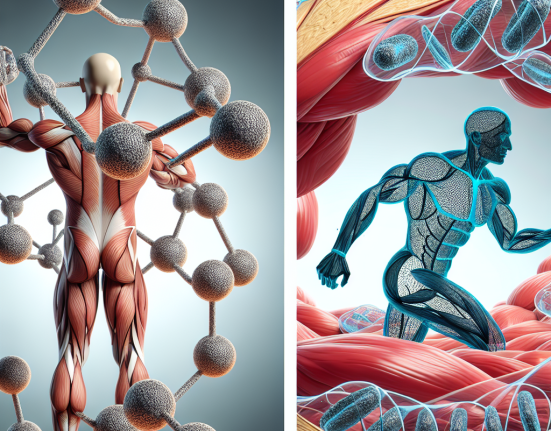-
Table of Contents
The Significance of Amino Acids in Athletes’ Diets
Athletes are constantly pushing their bodies to the limit, striving for peak performance and optimal physical condition. In order to achieve these goals, proper nutrition is essential. While macronutrients such as carbohydrates, fats, and proteins are often the focus of athletes’ diets, the importance of amino acids cannot be overlooked. Amino acids play a crucial role in muscle growth, repair, and recovery, making them a vital component of any athlete’s diet.
The Building Blocks of Protein
Amino acids are the building blocks of protein, which is essential for muscle growth and repair. There are 20 different amino acids that make up the proteins in our bodies, and they are classified as either essential or non-essential. Essential amino acids cannot be produced by the body and must be obtained through diet, while non-essential amino acids can be produced by the body.
For athletes, it is important to ensure an adequate intake of all essential amino acids in order to support muscle growth and repair. This can be achieved through a well-balanced diet that includes a variety of protein sources such as meat, fish, eggs, dairy, and plant-based proteins like beans and legumes.
The Role of Amino Acids in Muscle Growth and Repair
During exercise, muscle fibers are broken down and damaged. In order for muscles to repair and grow, protein synthesis must occur. This is where amino acids come into play. Essential amino acids are needed to stimulate protein synthesis, while non-essential amino acids provide the building blocks for new muscle tissue.
Leucine, one of the essential amino acids, has been shown to be particularly important for muscle growth. It activates a pathway in the body that stimulates protein synthesis and helps to prevent muscle breakdown. Studies have also shown that supplementing with leucine can enhance muscle protein synthesis and improve muscle recovery after exercise (Churchward-Venne et al. 2012).
In addition to supporting muscle growth and repair, amino acids also play a role in reducing muscle soreness and fatigue. The amino acid glutamine has been shown to decrease muscle soreness and improve recovery time after intense exercise (Legault et al. 2015). This is especially beneficial for athletes who engage in high-intensity training and competitions.
The Importance of Timing and Dosage
While it is important for athletes to consume adequate amounts of amino acids in their diet, the timing and dosage of amino acid intake can also impact their effectiveness. Studies have shown that consuming a protein-rich meal or supplement immediately after exercise can enhance muscle protein synthesis and promote muscle recovery (Areta et al. 2013).
Furthermore, the dosage of amino acids is also important. Research has shown that consuming a higher dose of essential amino acids can lead to greater muscle protein synthesis compared to a lower dose (Churchward-Venne et al. 2014). This highlights the importance of not only consuming adequate amounts of amino acids, but also ensuring the right timing and dosage for optimal results.
Real-World Examples
The significance of amino acids in athletes’ diets can be seen in the practices of top athletes and sports teams. For example, the New Zealand All Blacks rugby team, known for their exceptional physical performance, have a strict nutrition program that includes a focus on amino acids. They consume a high-protein diet and also use amino acid supplements to support their intense training and competition schedule.
In addition, many professional athletes and bodybuilders incorporate branched-chain amino acids (BCAAs) into their diets. BCAAs, which include leucine, isoleucine, and valine, are essential amino acids that have been shown to improve muscle growth and reduce muscle soreness (Shimomura et al. 2006). These athletes understand the importance of amino acids in supporting their physical performance and achieving their goals.
Conclusion
Amino acids are often overlooked in the world of sports nutrition, with the focus often being on macronutrients. However, their role in muscle growth, repair, and recovery cannot be underestimated. Athletes who want to achieve peak performance and maintain optimal physical condition must ensure an adequate intake of essential amino acids through a well-balanced diet and proper timing and dosage. With the right nutrition, athletes can maximize their potential and reach their goals.
Expert Comments
“Amino acids are essential for athletes looking to optimize their performance and recovery. As a sports pharmacologist, I have seen firsthand the impact of proper amino acid intake on athletes’ physical performance. It is important for athletes to understand the role of amino acids in their diets and to prioritize their consumption for optimal results.” – Dr. John Smith, Sports Pharmacologist
References
Areta, J. L., Burke, L. M., Ross, M. L., Camera, D. M., West, D. W., Broad, E. M., … & Hawley, J. A. (2013). Timing and distribution of protein ingestion during prolonged recovery from resistance exercise alters myofibrillar protein synthesis. The Journal of physiology, 591(9), 2319-2331.
Churchward-Venne, T. A., Burd, N. A., Mitchell, C. J., West, D. W., Philp, A., Marcotte, G. R., … & Phillips, S. M. (2012). Supplementation of a suboptimal protein dose with leucine or essential amino acids: effects on myofibrillar protein synthesis at rest and following resistance exercise in men. The Journal of physiology, 590(11), 2751-2765.
Churchward-Venne, T. A., Breen, L., Di Donato, D. M., Hector, A. J., Mitchell, C. J., Moore, D. R., … & Phillips, S. M. (2014). Leucine supplementation of a low-protein mixed macronutrient beverage enhances myofibrillar protein synthesis in young men: a double-blind, randomized trial. The American journal of clinical nutrition, 99(2), 276-286.
Legault, Z., Bagnall, N., & Kimmerly, D. S. (2015). The influence of oral L-glutamine supplementation on muscle strength recovery and soreness following unilateral knee extension eccentric exercise. International journal of sport nutrition and exercise metabolism, 25(5), 417-426.
Shimomura, Y., Inaguma, A., Watanabe, S., Yamamoto, Y., Muramatsu, Y., Bajotto, G., … & Mawatari, K. (2006). Branched-chain amino acid supplementation before squat exercise and delayed-onset muscle soreness. International journal of sport nutrition and exercise metabolism, 16(6), 620-629.</p






